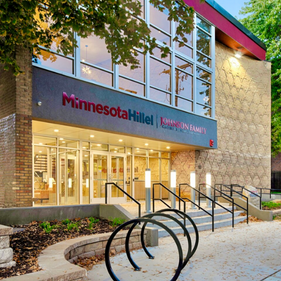No student should feel unwelcome at our Hillel because it’s not accessible.

Hillels across the country spearheaded new initiatives to make their spaces more inclusive this Jewish Disability, Awareness, and Inclusion Month (JDAIM). Every February, Hillel observes JDAIM to amplify the voices of Jewish people with disabilities and spread awareness in the Jewish community.
Naomi Hess, a senior majoring in public policy at Princeton University, has been hosting JDAIM events at Princeton Hillel since her freshman year.
“We already had all sorts of amazing intersectional Shabbat events here on campus,” Hess said. “I wanted to make sure that people knew about the intersection between Judaism and students with disabilities.”
Hess, who has muscular dystrophy, is continuing to spread disability awareness alongside a Hillel committee that reaches out to speakers and helps bring the events to fruition.
Katie Heinzer, a senior studying Slavic languages and literature at Princeton, has helped facilitate JDAIM events at Princeton Hillel. Heinzer moderated an event last year with Judy Heumann, an internationally recognized Jewish disability rights activist.
“It was a really good opportunity for the Princeton campus to realize how important the intersection is between disability advocacy and Jewish life,” Heinzer said. “This year, I’m really excited to host more events regarding accessibility, and to have another speaker speak to our campus.”
To help advance the intersection between disability advocacy and Jewish life, students at American University Hillel partnered with Repair the World, a social justice organization that helps Jewish students get involved in service projects. For their project, American University Hillel students worked with the Center of Jewish Education in Baltimore to learn how to caption videos to increase accessibility for the deaf Jewish community.
“The students are training to caption videos, so that even after the training ends, they can continue to use their skills for more service work as long as it’s needed, which is really exciting,” said Sarah Bernstein, a Hillel International Springboard Fellow at American University.
Not only are students assisting with accessibility in virtual formats, Hillels have also made changes to improve physical accessibility.
At University of Minnesota Hillel, the building recently underwent an 11-month renovation to install a new elevator, multiple ramps for entryways, more accessible bathrooms, and wider doors.
“During the process, there was a lot of discussion. Why put in an elevator? Why spend that much money when you may have one or two students who need it?” said Benji Kaplan, executive director of Minnesota Hillel. “And our answer was: No student should feel unwelcome at our Hillel because it’s not accessible.”
In addition to programming on Hillel campuses during JDAIM, Hillel@Home also hosted a series of online events.
One of these events was a conversation with Chella Man, who talked about his experience balancing his identities as a trans, deaf, Jewish, and Chinese-American man. Man is also speaking at Princeton this month to continue spreading disability awareness and inclusion.
Rabbi Ira Dounn, a senior Jewish educator at Princeton Hillel, feels inspired by his students, many of whom are champions for inclusion all year round.
“During Yom Kippur services last year, one of the aliyot I had was for Naomi Hess and her advocacy for disability rights,” Dounn said. “And I said, ‘Please stand in spirit or body to support the cause.’ The entire room stood up, which was truly beautiful.”
Hess said Hillel is an inclusive space where everyone is willing to learn.
“Rabbi Ira started this tradition of saying, ‘Please stand if you’re able,” Hess said. “And this is just a really small, linguistic change. But it shows that he and Princeton Hillel are absolutely thinking about people whose experiences are different from the norm, which means a lot to me.”
Gabriel Lesser is a sophomore at Johns Hopkins University.